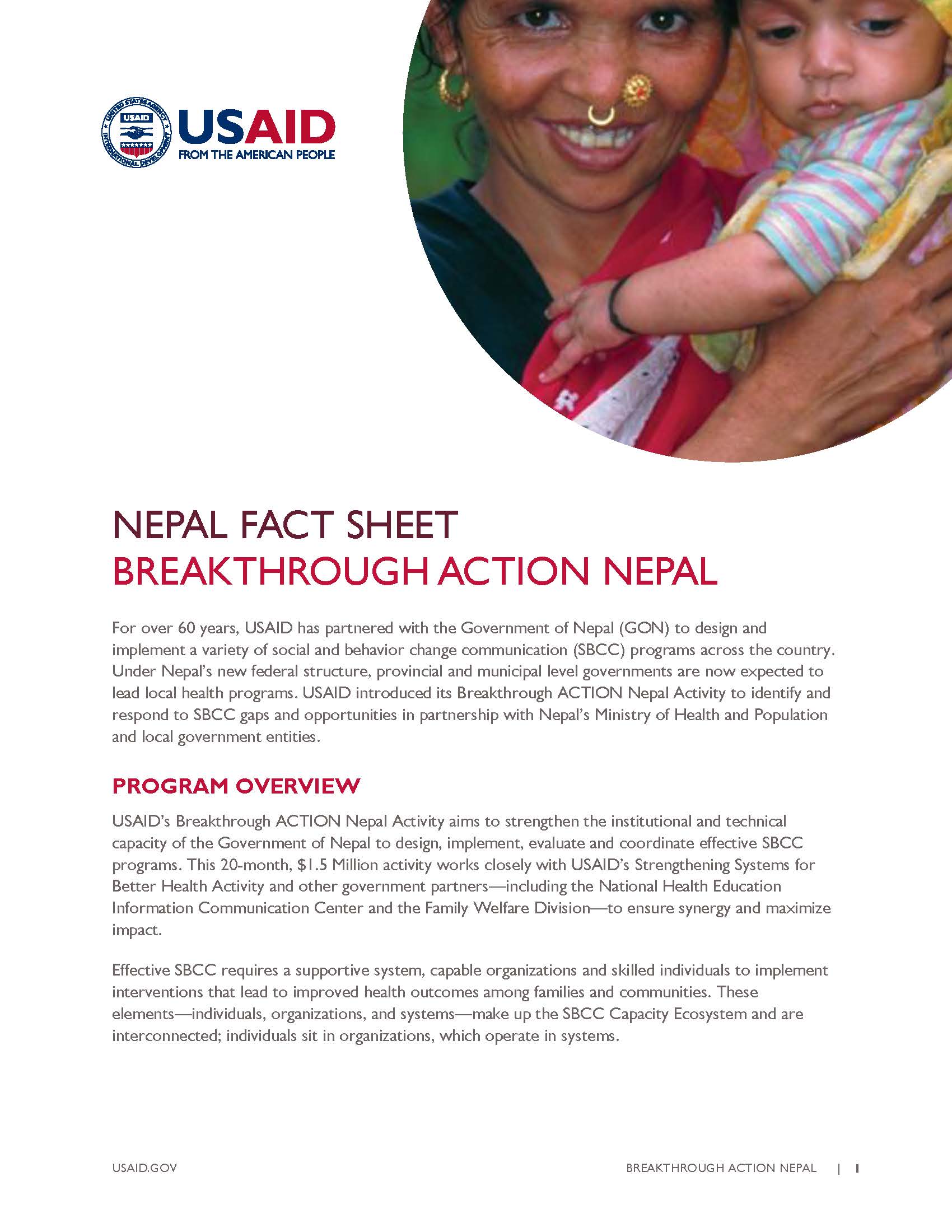Speeches Shim
![]() (135k) Breakthrough ACTION
(135k) Breakthrough ACTION
For over 60 years, USAID has partnered with the Government of Nepal (GON) to design and implement a variety of social and behavior change communication (SBCC) programs across the country. Under Nepal’s new federal structure, provincial and municipal level governments are now expected to lead local health programs. USAID introduced its Breakthrough ACTION Nepal Activity to identify and respond to SBCC gaps and opportunities in partnership with Nepal’s Ministry of Health and Population
and local government entities.
PROGRAM OVERVIEW
USAID’s Breakthrough ACTION Nepal Activity aims to strengthen the institutional and technical capacity of the Government of Nepal to design, implement, evaluate and coordinate effective SBCC programs. This 20-month, $1.5 Million activity works closely with USAID’s Strengthening Systems for Better Health Activity and other government partners—including the National Health Education Information Communication Center and the Family Welfare Division—to ensure synergy and maximize
impact.
Effective SBCC requires a supportive system, capable organizations and skilled individuals to implement interventions that lead to improved health outcomes among families and communities. These elements—individuals, organizations, and systems—make up the SBCC Capacity Ecosystem and are interconnected; individuals sit in organizations, which operate in systems.
Strengthening the SBCC system and organizations’ capacity to introduce evidence-based SBCC programs will help to sustain and accelerate Nepal’s health gains. This will also ensure that available resources are used efficiently and effectively to positively impact a wide range of individuals.With this goal in mind, USAID’s Breakthrough ACTION Nepal Activity is providing technical support to Nepal’s National Health Education Information Communication Center to identify and strengthen SBCC capacity across systems, organizations and individuals at all levels.
PROGRAM OBJECTIVES
1. ASSESS AND STRENGTHEN SBCC SYSTEMS WITHIN THE GON’S HEALTH SYSTEM
Breakthrough ACTION Nepal works with the National Health Education Information Communication Center to analyze the current state of Nepal’s SBCC system. Using a participatory SBCC capacity mapping exercise at the federal and local levels, the activity will assess existing competencies, review guidelines and SBCC materials and design action plans to strengthen the SBCC system. It will also pilot a SBCC package in four municipalities. The lessons learned from this process will be shared to inform future SBCC capacity strengthening activities in the newly federalized health system.
2. STRENGTHEN THE GON’S USE OF HIGH-QUALITY DATA TO INFORM PROGRAM DECISIONS AT ALL LEVELS
Breakthrough ACTION Nepal works with the National Health Education Information Communication Center to identify priority issues and analyze existing data from the government and partners to fill gaps in knowledge and inform SBCC activities for reproductive, maternal, newborn, child and adolescent health and nutrition. The activity will ensure that the data is user-friendly and easily accessible for critical decision-makers at appropriate levels.
3. ASSESS AND STRENGTHEN COORDINATION OF THE “SBCC SYSTEM” AMONG INSTITUTIONS, ORGANIZATIONS AND INDIVIDUALS PRACTICING SBCC
Breakthrough ACTION Nepal will engage with SBCC stakeholders to refine and advance SBCC in Nepal. The activity will bring SBCC health partners and stakeholders together to map the relationships, responsibilities and resources in the newly federalized health system. This group will harmonize messages and approaches, strengthen SBCC coordination, and offer opportunities for participants to exchange lessons learned and advance high-quality SBCC programming through periodic ‘deep dives’ into key SBCC skills, such as audience segmentation, monitoring or new behavioral insights.
EXPECTED OUTCOME
Breakthrough ACTION Nepal is expected to strengthen the institutional and technical capacity of the Government of Nepal to design, implement, evaluate and coordinate effective SBCC programs through training, advocacy, engagement, strategic planning and collaboration.


Comment
Make a general inquiry or suggest an improvement.